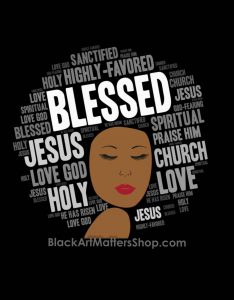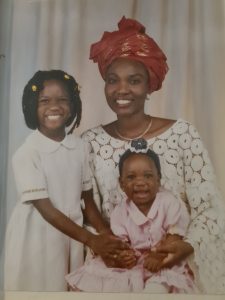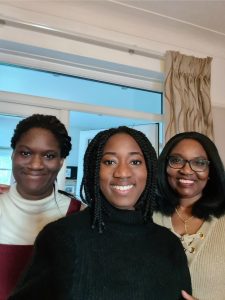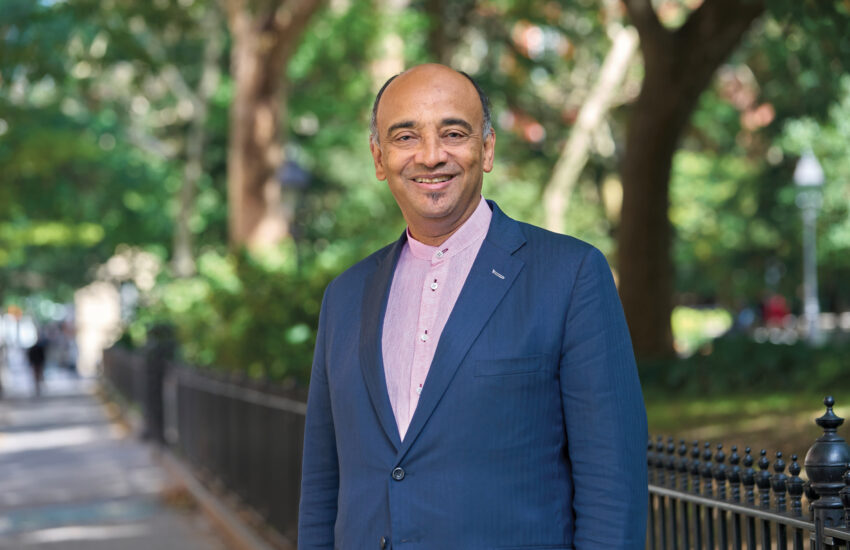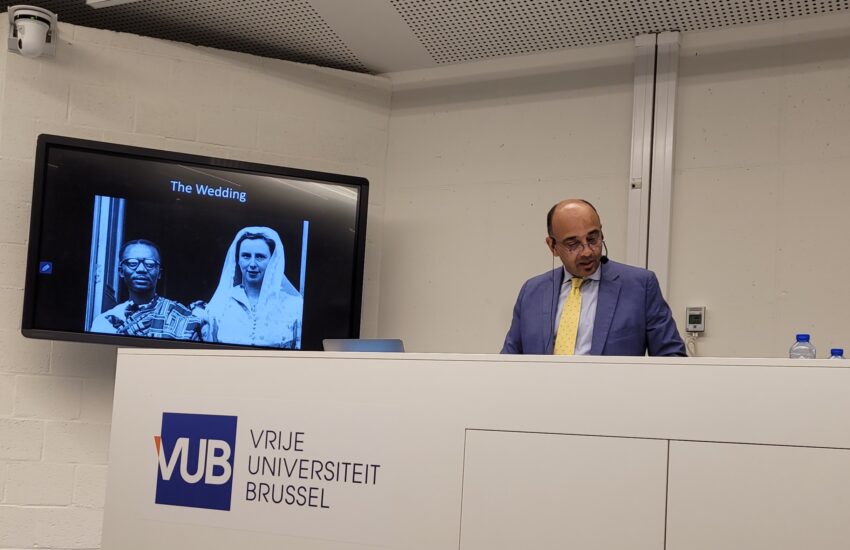Reflections on the Black Exodus from White Evangelical Spaces
Written by Mimi Anim
I still have not watched the George Floyd video in its entirety. I think it’s dehumanising and desensitising to need to watch the life extinguished from someone in order to feel compassion. I’ve read the transcripts and I’ve watched the first 90 seconds. I get the gist of it. I know that he cried out to his dead mother once he reached the other side. I was aware of the video while it was still trending on YouTube, still being shared on Black Twitter, while the police officer(s) involved were still in gainful employment (unlike many black people I know at this time) and before it got consistent news coverage on mainstream media.
Yet, despite initially keeping my consumption of this trauma porn to the bare minimum, and refusing to write polemic Facebook posts, I found myself drawn to podcasts and panels such as The Grapevine and For Harriet in order to listen to and participate in conversations with the rest of the Black diaspora. I was grateful that in an age when many can voyeuristically listen in online to conversations, these discussions were hidden behind a paywall. For my own peace of mind, I needed to discuss what I felt away from the white gaze.
When the protests took off, I stayed at home because I believe in staying home, protecting the NHS, and saving lives. Secondly, because having attended protests before, I know that anyone with a megaphone can chant whatever they wish and co-opt a movement for their own purposes. Sure enough, a small minority of protestors switched the Black Lives Matter chant to “F*** the police and that was a big no-no for me.
Despite the global and multi-ethnic outcry against the death of George Floyd, I’d never felt more discontented and disillusioned in my life. My mind obsessively tried to make sense of the reaction at such a manic speed that I had a migraine for an entire week. I’m convinced that humans are holistic beings with minds, bodies, and souls. I know this because thinking too hard also took a physical toll. For a week, I woke up feeling physically fatigued and too drained to sit at my desk.
I was thinking that what had happened to George Floyd was outrageous, but then again, wasn’t the execution on site of 10-year-old Tamir Rice playing with a toy gun equally so?
What about Philando Castille who was stopped during a routine traffic stop? He calmly informed the police that he had a licensed firearm and that he was going to reach for that license alongside his driving license. His fingers barely left the steering wheel before he was shot multiple times. His wife can be seen and heard crying in the backseat while their child comforts the mother.
Then there was Sandra Bland who was pulled over for a minor traffic violation and antagonised the police officer by lighting a cigarette. The officer’s response was that he would ‘light her up’ — a crude reference to tasering her severely with around 50,000 volts. She was found hung in her prison cell three days later.
Then there was Ahmaud Arbery who was out for a jog when he was shot by two white residents because he allegedly fit the description of a robber. The residents were arrested a month later.
What of Breonna Taylor? Her house was broken into by police officers who had been issued with a no-knock warrant. The officers were not in uniform and did not identify themselves. They shot her multiple times in her sleep and had been looking for an ex-boyfriend suspected of drug offenses, who was already in police custody. No drugs were found at her house.
In every case mentioned, nobody was placed in police custody without public outcry. All cases involving police officers involved placing officers on administrative leave, or else, disbarring them from the police force for failing to follow police protocol. But Black officers such as Carol Horne and Darryl Boykins who acted as whistle-blowers regarding excessive force were subsequently fired. If you want to know why police brutality makes Black-British people upset when there are no guns in this country, then simply look at the impunity of officers who break the law. Look at the punishment of Black officers who report their co-workers, because that gaslighting is alive and well in the UK too. Not being believed when it’s your word against a white person’s is common across the diaspora (from a young age too) and that is a form of violence — it is economic and social violence; it certainly violates one’s intrinsic worth and equality before the law.
Being shot in one’s sleep is as disturbing as being choked to death. Breonna Taylor’s death has resulted in an end to no-knock warrants. It remains in the public consciousness of the diaspora with $5 million being raised for her family. (Most) white people remain ignorant of her case because it was not caught on camera. So I return to the question of why, on this occasion, white America and Anglo-Saxons within the UK chose now to acknowledge racial injustice. I believe that the reaction to George Floyd stems from the length of the video; the fact that there was no plausible deniability, unlike the other cases and because of the Covid-19 lockdown. This activism and concern are born and bred from boredom. Boredom forced the mainstream media to extensively cover the issue.
This brings me to why I am writing about this despite being a Black evangelical woman based in the UK. In short, what ties the racial reckoning over police violence in the UK to me is anti-blackness. Anti-blackness affects maternity deaths in the UK and US in equal measure (a fact that my mother is acutely aware of after she was forced to give birth to me with only midwives present, as her doctor holidayed in the Maldives, despite promising to be present in case any complications around her fibroids arose). It has also dogged my days in church and in the workplace in ways that the newly passed Halo Code is trying to rectify.
So what of my white brothers and sisters in Christ? They believe in total depravity — that is sinful nature infiltrating every aspect of man and his relationship with the world (including systems and institutions). Christians don’t think sin only has inter-personal implications. But the burden of proof for a uniformed officer to be depraved is too high. Anglo-Saxons are a civilised tribe who have transcended tribalism; they are white — the colour of purity, and the detained are often black — the biblical colour for guilt. Therefore, the burden of proof is on the person the colour of guilt. Seeing is believing when it comes to racism — ‘Doubting Thomas’s’ abound within the church. I frequently compare their silence and lack of activism on this issue with, for example, abortion or fiscal budgeting. On the issue of race, we do not speak with one unified voice. When Anglo-Saxons speak of the ‘global church’ they are including African Americans as an afterthought.
I do not relish writing about race. It is exhausting, and I know from experience how freeing self-forgetfulness can be. I chafed from a young age against being a stereotype. I played the guitar and possessed an encyclopaedic knowledge of classic rock. I watched the Godfather trilogy before Malcolm X. Any hip-hop that wasn’t mainstream enough for radio play was unknown to me. I never attended a rave and was far removed from ‘booty-shaking’. I was so alternative that during my A-levels, a teacher gave me the award for ‘quirkiest student’. This was the context in which I became a Christian. I clung to bible verses such as ‘there is neither Jew nor Gentile for we are all one in Christ’. It was liberating to have my identity be in Christ first and foremost and not in the high and sometimes overbearing expectations of Black excellence set by my Nigerian parents.
I loved being seen and treated as an individual and quickly threw myself into my University Christian Union with as much zeal as I’d ever had reading Maya Angelou or Malcolm X. When a Black Christian asked me to attend the ACCF (Afro-Caribbean Christian Fellowship), I rebuffed the invitation and berated him for ‘dividing the body of Christ’. I had come to University to recreate myself away from my parent’s watchful eye and boy did I feel affirmed as an individual. If you’d asked me at the time what was compelling me, I would have told you the gospel. I still believe that, but I now understand that even our best actions are rooted in mixed motives. That whole period, in hindsight, was full of escapism.
My worldview was challenged and enlarged by the extension of hospitality by white church families as much as it was in any lecture theatre. Church members were trusting enough to let me hold their babies without asking if I liked children. I can distinctly recall watching a boisterous and buoyant toddler asserting herself over the rest of her older siblings. I told her mother that maybe she’d grow out of it. The mother [rightly] hoped not. The exchange took me straight back to my first day at a mostly white primary school where the teacher had asked my mother whether I’d been born and raised in the UK — despite my very regional East London accent. Why did she ask? Because I was ‘very loud’.
Christian life allowed me to be loud again — I partook in two on-campus debates for the Christian Union. Nobody complained — but when I applied for a church internship, I was asked by a fellow applicant whether my reservations were based on not being able to preach. I wondered where the doubt over my orthodoxy stemmed from.
I was so immersed in church life that I often socialised with them outside of church. On one such occasion, I went to a Christian house party, it just so happened to be attended by my benefactor who had pledged to support me and a fellow trainee. It was full of merriment and jollification until, unprovoked, my edge-lord benefactor said that ‘Black women had the worst hair of all the races’. I asked him how he could say such a thing, but he doubled down. I scanned the room. I was the only Black person there. There was no one to defend my honour but my future co-worker looked incredibly uncomfortable — he couldn’t look me in the eye. It was then that I had an uncomfortable epiphany.
It was also the inevitable endpoint to my first embarrassing university experience when a non-Black speaker at the Christian Union had mistakenly referred to me as a man. He was genuinely embarrassed but my peers found my perceived masculinity to be a laughing matter. I did wonder at the time how many of them laughed when the online conspiracy theorists claimed that Michelle Obama was actually Michael Obama.
Christians believe in gender norms but that doesn’t mean that they will behave chivalrously unless you are a literal sister, girlfriend or mother of theirs. Christians believe in not intervening in the interests of keeping the peace. But it was a false peace. One which required psychological warfare on my part. I had to remind myself that I didn’t subscribe to Eurocentric beauty standards, which was very easy given my secondary school experience and the father that I had. It didn’t stop me being frustrated though. I wore extensions for the rest of the period. I could have artificially straightened my hair, but I had no interest in that. I never even grew my afro out — it barely qualified as one, but it was still enough for me to either be invisible or hyper-visible. It crossed my mind that a Christian man would never under normal circumstances insult the looks of a woman or rank women. So why me? Because in both Christian circles and the world at large I was Black first and a woman second.
White Brits have never acknowledged that their history in South Africa is blighted by a caste-system with whites on top, Blacks at the bottom, and Asians in the middle. No Asian from church sported short Afro hair as I did. It is a very unique look and being Black historically has been a unique experience in the context of whiteness. We know from history that when the Jesuit priests in modern-day Brazil objected to enslaving Native Americans, they had no objections to and even supported the enslavement of Africans. I noticed that, particularly in the UK, the Black standard of beauty was biracial. In other words — half-white. The Black woman that had been lauded as beautiful when I was growing up, such as Lauryn Hill, Whitney Houston, Brandy (who wore braids like myself), and Naomi Campbell had been replaced with green-eyed Rihanna, green-eyed Tyra Banks, and blond-haired Beyoncé. This was an erasure. This was white supremacy manifested in beauty standards. It was more harmful than the toppling of statues and it showed me that it is possible for a society to regress. Racial ambiguity was the post-racial future because of British ignorance of the caste-system that whiteness has produced in countries like Brazil.
Upon spending the summer with my mother, I learnt that she had offered her trolley to a white man at the supermarket, to which he responded with: ‘No thanks, I don’t even want to touch you’. The white man didn’t want to touch her because she was Black and dressed in traditional attire. He had been so shocked by his own words that he clasped his mouth with his hand and apologised immediately. I knew then what British people meant when they talked about racial progress. In the ‘90s, police officers and first responders didn’t touch Stephen Lawrence because he was a Black teenager, and making contact would have potentially meant being contaminated by the Black male body which was potentially disease-ridden with HIV. So a 18-year-old boy died with nobody holding him. A couple of decades later, the Black body is still seen as contaminated, still seen as unclean, but it’s ok now because at least they aren’t being allowed to bleed to death. We can see it in the white flight that has occurred in East London.
I don’t deny that progress has been made. In the early 2000s, my mother was sacked from the college where she taught English despite being awarded a good grade by Ofsted. She later learnt from a white colleague that the person they’d replaced her with was a white chef with no teaching experience. She successfully took them to court and was offered a settlement and an apology for racial discrimination — something easy to argue on Twitter but hard to prove legally. It could never happen to me. But employment disparities between white and Black graduates is an ongoing issue.
My internship was met with fierce (and often unfair) opposition by my mother, but given her life experience, I understood why she was distrustful. When I went to a Christian conference in Wales, once again, the same joker referenced my dark skin and wondered aloud whether they’d be able to spot me outside at night. It was met with sniggers by the young adults. This time he apologised and it was so genuine that I accepted. What I couldn’t get past were the white bystanders who seemed to think that there was nothing wrong with calling me invisible. The brazen, callous nature of these Gen Z’s made it crystal clear to me that while enlightenment philosophy teaches that we become more rational with the passage of time — racism, or any sin for that matter, cannot be bred out. Again, I never reported this to my church as I felt sinful for admitting that it even bothered me; that I couldn’t turn the other cheek. But being financially supported whilst also being insulted by the same people felt like prostituting out my identity. I had had enough and I left unceremoniously less than two months later.
Interviewing for jobs was another experience. I interviewed at Fenchurch Street in a building called ‘Plantation Place’. I went in and was hit with a barrage of questions by a Nigerian security guard trying to build a rapport with me. I didn’t appreciate the assumption of kinship or the assumption that I was Muslim because of my name. I was curt with him on the way in. On the way out, I took the time to greet him and stop for chit-chat. What had changed was that upon entering the building and finishing the interview, I realised that there was racial diversity within the office but heterosexual Black men were completely missing. All the Black representation was carried by Black women or Black gay men.
The criminal depiction of Black men has adversely affected professional Black men. It is not an individual decision but an institutional decision which comes from the hyper-masculine depiction of Blackness. Since slavery, Blacks were depicted as animalistic with superhuman strength that requires multiple bullets in order to be put down. That strength is often depicted as being partnered with less intelligence and an unbridled sexual appetite. This hyper-masculine depiction of Black people gives Black men an artificial and objectifying sense of cool which doesn’t translate into workplace success. What the absence of Black men in professional spaces has done is help to masculinise Black women who are not able to practice assortative mating like other races. This lack of assortative mating is a contributing factor to Black women disproportionately having children out of wedlock. It’s not because white women were able to make better choices than Black women — they simply have more options. Often, in order for a Black man to soften his image to the white corporate world — he’ll marry a white woman; the marriage market is as political as everything else in life.
Race is misgendered in a way that is damaging to me personally. The first time I used an Uber, the driver tried to push his erection on me, he thought it was a joke when I pushed him off and told me that I’d only refused him because ‘all Black girls like to get on top’. Black women have been painted as being aggressive, rhythmic and up-tempo, easily excitable and with boundless energy. Sound familiar? It should, because these relatively harmless stereotypes (that I’ve laughed at in the past) become really ugly in a sexual context (never mind the fact that the aforementioned are all euphemisms for ‘wild’). Yes, the hyper-sexualisation of Black women is perpetuated by hip-hop, but it clearly predates hip-hop and has been around post-slavery as evidenced by the following Rolling Stones Lyrics:
White girls they’re pretty funny
Sometimes they drive me mad
Black girls just wanna get f**ked all night
I just don’t have that much jam
The abstraction and essentialising of certain alleged racial traits are complicated issues that I’ve never discussed with other Christians. They don’t want to know and so I carry that burden alone or with the help of non-Christian friends. I didn’t want to carry the weight of the news on my own which is why I’ve felt increasingly estranged from my Christian family. To raise awareness of these issues is often met with a reminder that ‘identity politics’ is destroying public discourse. While I acknowledge that first and foremost my identity is in Christ, I’m also a sister, a daughter, and Black. I didn’t stop being any of those things when I became a Christian — instead, those identities are subjugated and made to serve my primary identity. I can’t take off my skin and God hasn’t asked me to.
This brings me back to the issue of civil unrest in the UK. During this time, I was dismayed by the lack of any acknowledgment that the US was in the midst of an existential crisis because of race, but as soon as instances of looting became apparent, the Martin Luther King posts went up, and worst of all, ‘two wrongs don’t make a right’. I will never endorse breaking the law. But to have the temerity to draw false equivalences between the destruction of property and the destruction of human life betrays the views of some British people. They see property as equivalent to Black life. Thankfully, nobody who attends my church said this but if they had, I would refuse to break bread with them unless an apology was forthcoming. This might be an overreaction based on sinful pride, but it’s so hard to tell because I’ve never seen church discipline enacted in the context of race. I only know that people have been excommunicated for marrying non-believers.
When it comes to the most contentious issue of statues in the UK, I have strived to form a nuanced view on the issue. l believe that war memorials including Churchill’s statue are off the table. Yes, he held some despicable views which were criticised by the American President of the time — but he is primarily remembered for the war effort and he didn’t commoditise Black bodies in order to practice philanthropy for whites. I’ve seen many posts on not ‘whitewashing’ history when it came to the Edward Colston statue. While I cannot endorse illegally tearing it down, a cursory google search revealed the following:
The campaign to have a plaque explaining how his philanthropy was funded has been ongoing for 25 years (that’s my entire lifetime). This has been thwarted and frustrated by white historians and councillors that Black people go cap in hand to, in order to beg them for acknowledgement which they may or may not provide at their discretion and out of their magnanimous nature. It was originally a three-paragraph statement that revealed how Colston ‘played an active role’ in the enslavement of 84,000 Africans including 12,000 children, resulting in 19,000 being thrown overboard. This is when the editing of history occurred. Councillors sought to strike out the sentence which called him a Tory MP. Then a Bristol historian who objected to the word ‘trafficked’ replaced it with the word ‘transported’. Humans are trafficked, goods are transported. The statue being up is history but history without any explanatory power — stone and marble are crude forms of education. It is white supremacy to assume that those who wanted to take the statue down were Barbarians trying to destroy British history that had been told objectively by white rational-minded people. This ignorance surrounding the 25-year Colston campaign demonstrates a lack of curiosity from (some) white Brits that borders on contempt.
Likewise, when it came to the London protests and the (one) instance of the Union Jack being set alight — I abhorred this action completely. I wore the Union Jack while representing the UK as a London 2012 Olympics volunteer. But when you have charity campaign organisers endorsed by Priti Patel posting online that ‘There is no black in the Union Jack’, are you really that surprised that disenfranchisement has led to anger? The third anniversary of Grenfell Tower and its overwhelmingly Black and brown victims has been met with state lethargy. If Grenfell Tower survivors had been rehoused and Windrush victims (whose documents were erased by the UK Government in the most obvious form of cancel culture) had been financially compensated, the civil unrest that ensued in London would never have caught on the way it did.
So, where do I think statues of slavers should go so that they are not forgotten? A slavery museum would be a start. The US has plenty, as does Brazil. Even Australia has museums that are intended to preserve the memory of the Aboriginals that were displaced. Perhaps we could teach children that we only just finished paying off the debt we owed as a nation to the families of slave owners in 2015. That’s not vengeful, but an acknowledgement of our history.
Of course, in the discourse on race, much is shrouded in ambiguity. Why for instance, when I spent two weeks during the last general election canvassing in Churchill’s old seat and had pleasant conversations with many people was I only invited in for a cup of tea in the December cold by people who looked like me— despite not supporting my candidate? Perhaps they could see that I was a similar age to their children or perhaps they weren’t scared that I would burglarise them with a clipboard in hand. It’s hard to make sense of these experiences without appealing to race.
In my darkest moments, I wonder if all the amazing hospitality I received at church would have been offered if I’d knocked on their door last December rather than meeting in church. That’s a counterfactual world that I have no access to. I do know that their acknowledgement of real pain feels like a soothing balm, even if the topic has been broached by evangelicals warily, reluctantly, and with great trepidation. I don’t like feeling as though I have to coax a response from people to see me. I do however understand that most preachers are reluctant to let their preaching schedule be dictated by external events. I also need to examine why the church’s polarised and disparate response is really of concern to me. Why should I expect them to disavow, condemn, or even lament such injustice whilst also holding the position that it is unreasonable to expect the same from Muslim communities after acts of terrorism? Maybe, because I suspect that their history of being pusillanimous bystanders is a cyclical problem for people like myself.

